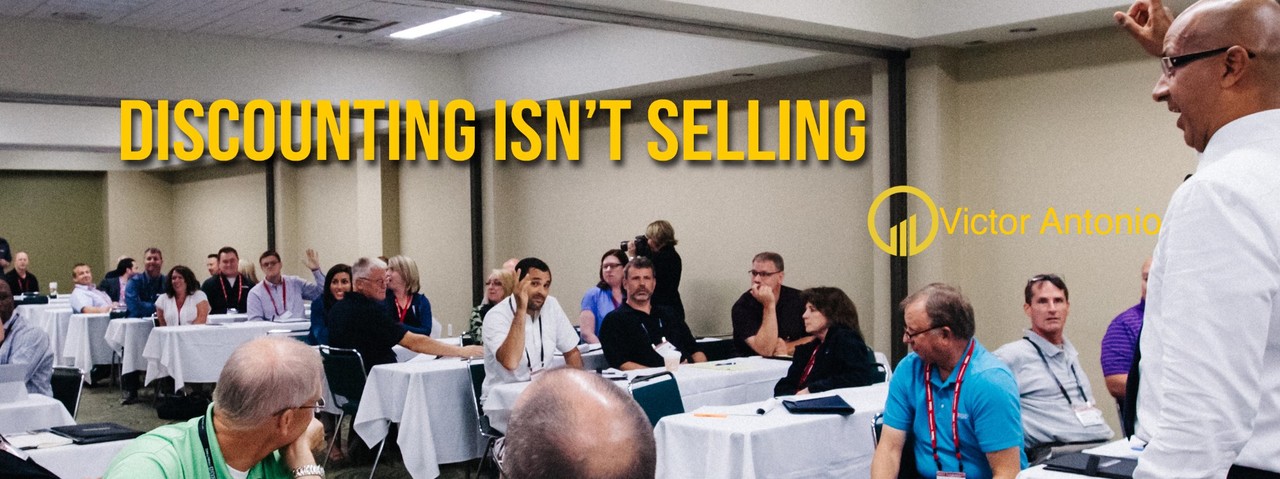
Discounting Isn't Selling
Yesterday during a workshop I had several attendees continually ask me about how to use discounting to sell more. One confessed that she artificially inflates the number by X% over her desired margin so she can offer the client a discount on the close. This was somewhat intriguing so I decided to dig deeper.
Victor: “Does the client ask for the discount?”
Attendee: “No. I usually say to the client that if they buy today I’ll give them an X% discount.”
Victor: “Why do you offer the client the discount if they don’t ask for one?”
Attendee: (With a dead pan look) “So they’ll be motivated to buy.”
Victor: “So your clients are not motivated to buy when you get the close?”
Attendee: “Uhhh…”
Victor: “In other words, after you’ve explained what your product can do for their business do they look like they're ready to make a decision?”
Attendee: “Of course!” (with a hint of indignation)
Victor: “How do you know?”
Attendee: “Because they’re asking me buying questions.” (Great response)
Victor: “So If they’re asking buying questions, why are you discounting?”
Attendee: “Because I want them to buy right there and then.”
Victor: “I get it and they’re indicating they’re ready to buy with their questions; so why not ask for the order without discounting?”
Attendee: “Because my clients always expect a discount when they buy from me.”
Victor: (Shaking my head)
The attendee is lost! She’s doing several things that are really hurting her business.
- By artificially raising her prices, she has signaled to her salespeople that the product really isn’t really worth the regular price. And, that the only way to sell the product is to fool the clients by artificially raising the price and then discounting it.
- By artificially raising her prices, she may also be pricing herself out of the market. If all the products in her portfolio are overpriced, she could be losing business she’s not even aware of.
- She’s conditioned her clients to ask for discounts which mean they will ask for more than the standard discount (e.g., “Look, I know you gave me a 20% discount, how about another 5% and we’ll close this deal?”).
- She’s built her sales process, specifically the close, on the premise of discounting; never a good sales training model to build a solid business on.
- Her clients may question her integrity since they notice that she’s always discounting. Which means: (a) is she really giving me the best price and (b) how do I know someone else is getting a better price than I?
I said to her, “Today you’re going to learn how to ask for the order without using discounting as a primary tool. In fact, I’m going to show you 8 tactics that you can use to avoid discounting.” That got her attention!
- Offer the client a substitute option
- Remove something from the offer or offer a 'step-down' version
- Give them an extended payment plan (e.g., Net 30 to Net 90)
- Offer financial payment plans
- Offer them used (or returned) product
- Extend the warranty
- Offer 'free' training
- Throw in a 'loss leader' product
I'm sure you can come up with a few more.
That said, these 8 tactics are meant to transmit to the customer that you value your products or services and that you are a reluctant discounter.
When the only way to close a sale is through discounting, you’re not selling, you giving your profits away. Any idiot can discount; that’s not selling. True selling is demonstrating value and capturing that value without eroding your profit margins.
Ynneb Music, 16th annual Latin-Grammy Nominee for percussion/arranger for The Jose Valentino Latin Jazz Ensemble.
6yLove it!!!! This can be used in what I do musically....
President, Group Publisher at Guerrero
6yKim Harrington David Watson KEMP G. PILE Philip Taylor Anna Jensen (née Schlumbohm)
Tech Growth & Marketing Expert | Global Business Strategist & Executive Trainer | Digital Transformation Strategist | Author |
6yWooow!!! Enlightening. Sending this to my team right away; it makes so much sense.Thanks Victor